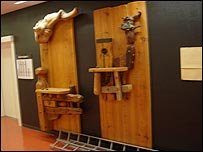|
By Nick Triggle
BBC health reporter
|


Health is devolved to local government in Sweden
|
Whenever health systems are ranked, Sweden always seems to come top or at the very least a close runner-up.
With its dazzling array of new hospitals and plentiful supply of doctors, nurses and state-of-the-art medical technology, the Scandinavian country can confidently boast it provides first-class care to its nine million inhabitants.
Cancer survival rates, infant mortality and life expectancy figures all outstrip many of its European neighbours.
So how does Sweden do it and what can the National Health Service learn?
The simple answer is that Sweden has a long history of spending lots of money on health.
Money
In the early 1980s, the country was splashing out 9.2% of its GDP on health care - the highest in Europe and over 3% more than the NHS got at the time.
Two decades on it may still be spending the same proportion, but many countries, including the UK, are still playing catch up.
The result is that Sweden has more doctors per head than most - 3.3 per 1,000 compared to two per 1,000 in the UK - allowing patients to have direct access to everyone from hospital consultant down.
But it is not just a matter of money. Sweden, traditionally reliant on treating people in hospital rather than in the community, recognised in the mid-1990s that as people began to live longer, health services had to change to meet increasing demand.
 |
Comparison between Swedish and NHS health care

|
As hospital treatment tends to be expensive compared to GP or district nursing care, Sweden started to push for more patients to be treated in primary care in much the same way ministers want the NHS to do.
Over the last eight years the number of visits to GPs has gradually risen, compared to a drop in the number of consultant appointments.
The Swedes have also tried to push patients through the hospital system much more quickly.
In 1992, the average length of stay stood at 7.9 days, compared to just over four now. In the UK it is nearly six.
Having less people treated in hospitals, for less time, has allowed the Swedish county councils, which are responsible for hospitals and GP services and fund 70% of health services through their tax raising powers, to plough more investment into community services.
The number of people being given medical care at home for conditions such as heart disease and diabetes has risen from 35,000 people to 80,000 people.
And there has been an increase in local health centres, which provide an extended range of services from GP care to physiotherapy.
Roger Molin, deputy director of the Swedish Association of Local Authorities, said the country has several advantages over the UK in pushing through such reforms.
He said the devolved nature of the health system meant councils were more responsive to patients needs than a more centrally-controlled system such as the NHS.
Nurses
And he added: "Traditionally, nurses have had a much greater role in health care here. They have got involved in treating long-term conditions such as asthma.
"But there is more flexibility in our system. Patients can either register with a specific GP - as 40% do - or use any doctor they like".
But Mr Molin also said Swedish councils have not been afraid to use the private sector.
About a tenth of health care is provided privately, but unlike the UK much of this is at a community level rather than in hospitals.

Hospitals have to spend 1% of their building budget on art
|
Mr Molin said private providers have brought more efficiency to the system, but had been largely contained to the primary sectors as it was not so easy to introduce change to large institutions such as hospitals.
The use of the private sector is also cautiously welcomed by doctors.
Dr Thomas Flodin, a board member of the Swedish Medical Association, said he did not have any objection to increased use of the private sector.
"What is important is not who provides the care, but that it remains available to everyone."
And this seems to be one of the underlying characteristics of the Swedish system.
Unlike in the UK where a two-tier system has developed with wealthy patients paying to go private, there is virtually no market for such care in Sweden.
While patients have to pay for public health care, fees are nominal, limited to a ceiling of �60 a year.
Only a few thousand people have private health insurance and firms which provide services for the public health system are banned from providing private care.
Trust
Swedish doctors believe the system allows them to develop a better relationship with patients when they need major hospital treatment - analysts estimate a third of consultant time is spent with patients, one of the highest rates in Europe.
Dr Hans Berglund, a cardiologist at the Karolinska University Hospital in Stockholm, who has worked in countries across Europe and in the US, said: "There is a level of trust that does not seem to be there elsewhere."
But Chris Ham, professor of health policy at Birmingham University, said the success of the Swedish system had to be viewed in context.

Most of Sweden's hospital were built after World War Two
|
He said while the country had a "well developed" health system, society was relatively homogenous without the immigration and levels of poverty other European countries had.
And for all the platitudes, the Swedish system is far from perfect.
Patients routinely complain about waiting lists - the government has recently introduced a six-month waiting guarantee - and it is common to find hospital doctors scrambling around trying to find beds for patients.
And Swedish councils are also looking to learn from the way the NHS measures hospital performance through targets and performance indicators to iron out regional variations.
But with these being phased out in the NHS, it remains to be seen whether they will catch on and, for the most part, Britain seems to have more to learn from Sweden.
